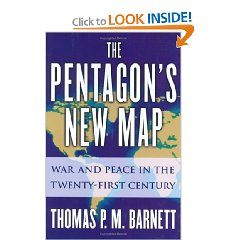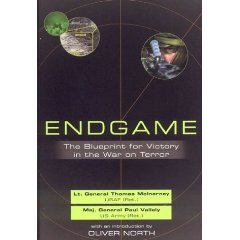Tellingly, the book opens with Sun Tzu on the importance of the art of war to the state, and fails to reflect, at any point in the book, the more vital Sun Tzu observation that “the acme of skill is to defeat the enemy without fighting.”
The author is justifiably proud of being able to take down Iraq with half the troops and half the armor and artillery needed in Gulf I. If you read this book in conjunction with Stephen Flynn's book on “America the Vulnerable,” where he cries out for 16,000 more Customs inspectors, you can see US national security is “inside out & upside down”–in the 21st Century we need half the uniformed military troops and half the military “hard power” acquisition, but we have failed to understand that we need ten times the manpower and ten times the acquisition within homeland security–we are still lying to America about this contradiction, one reason why I chose to tie these two books together with complementary reviews–Flynn is nothing short of brilliant as a counterpart to Franks.
Among the little gems in this book:
Franks got purple hearts in Viet-Nam only for the wounds that sent him to the hospital–minor wounds not requiring evacuation were ignored. What a contrast with Kerry! Page 114.
In the 1970's, when the information revolution was just started, artillery units did not have their own communications. Franks rightly earned a reputation as an innovator by buying CB radios such that his artillery pieces moved as if they could read the mind of the operators they were supporting. Today, not only has the information revolution largely passed by the intelligence community, but the “rest of government” including state and local law enforcement, and private sector partners vital to national security, are in precisely the same position, in the year 2004, as was military artillery 30 years ago. Page 125.
When General Franks was selected in the early 1990's to lead the creation of the 21st Century force, I find it absolutely riveting and fundamental that intelligence was not one of the domains or building blocks of the Army (one reason why the Stryker fraud was so easily perpetuated on Congress and the public). Page 173.
As of 2002-2003, Service “parochialism”, Service chiefs and staffs out only for themselves and their service, and completely unwilling to work jointly or even worse, procure systems and capabilities that worked jointly, remained the single largest cancer within DoD. Page 207, page 288, and passim.
Bin Laden's attack on the Cole “had the force of a cruise missile.” Page 220. See my review of Paul Williams, “Osama's Revenge”, where the bottom line is that individuals now have the power to deliver both nuclear and cruise missile effects inside of America, but our national security investments and priorities remain “upside down” and fail to protect us from an “inside out” perspective.
Both defense department and U.S. intelligence community counterintelligence and intelligence relevant to force protection failed miserably in the closing years of the 20th century. We were blind in part because we relied on Yemen to tell us about threats, rather than being able to penetrate groups in Yemen directly–hence the “surprise” of the USS Cole attack being so successful and so unconventional. Page 224.
Throughout the book there are references to capabilities that avoid discussing time lag issues–cruise missiles that take 2-6 hours to get to the target, B-2 bombers that take 40 hours to get to the target, all easily detectible. In my view, General Franks paints an overly positive picture of our “hard” capabilities, in part because he glosses over or ignores time-space-detection-avoidance issues that are vital. Pages 245, 259, and passim. This also applies to the movement of Special Operations Forces into denied areas. Page 296.
Rumsfeld evidently believed that invading Afghanistan would “finish” Bin Laden. How wrong was he? Page 285.
Franks and the U.S. leadership evidently believe that Special Operations Forces are “hidden” at K-2 Air Base in Uzbekistan. I personally think they will be rolled over and massacred at some point in the near term (2-4 years). Page 286.
Franks is brilliant in his creation of a Lines of Operations versus Target Slices conceptualization, this is the single best page in the book, a real keeper. Page 339, illustrated 340.
Franks fell for the myth that money will buy loyalty and action among the tribes of both Afghanistan and Iraq, a completely erroneous view. Page 332. He also fails to mention that Rumsfeld allowed 3,000 Taliban and Al Qaeda to be evacuated from the Tora Bora trap by Pakistan, with Rumsfeld's active permission (out of naiveté). Page 377.
Troubling to me is Franks' blindness to the cost, both in dollars and in opportunity cost (time, space, pol-econ, etc.) of using very expensive and very ineffective hardware to achieve marginal results. His approach to warfare is almost mechanical in nature, eager to send waves of aircraft against Stone Age tribal positions, without regard to cost and effect. Pages 379-381.
Regional commanders-in-chief need to manage U.S. Intelligence Collection requirements, priorities, and capabilities. This one hit me with “wow” force. I actually agree, provided that the regional CINCs become inter-agency in nature. We are at war forever, and placing clandestine and technical collection as well as open source intelligence collection assets under CINC operational control makes sense to me, especially if DoD finally steps up to the plate and creates an intelligence component commander [this does NOT undermine the need to move NRO, NSA, and NGA out of DoD and into the DCI's management authority.] Page 234. Later on he alludes to the need for CINC budgets, and I agree–we need to change Title 10, and strike a better balance between acquisition and budget authority for type and regional commanders. Page 397.
My summary: Intelligence failed, heavy metal military did what it was asked to do under solid operational leadership, we are still losing strategically and in the long-term.
Better books:
The Battle for Peace: A Frontline Vision of America's Power and Purpose
Battle Ready
The Paradox of American Power: Why the World's Only Superpower Can't Go It Alone
The Sorrows of Empire: Militarism, Secrecy, and the End of the Republic (The American Empire Project)











